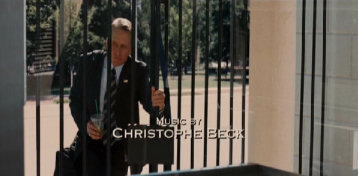
The Sentinel (2006)

Director: Clark Johnson
Score soundtrack released 2006.4 by Varèse Sarabande
THE FILM
Michael Douglas is randy on the job, for a conspiracy whodunnit movie.
As films go, this should have gone straight to DVD. As a thriller it fails by presenting us with only a few mastermind suspects (and plumps for the obvious one rather than the two potential humdinger twists this reviewer anticipated), shows few thrills (no matter how much shouting and shakey camera it throws), and paints its main characters as little more than identikit. Beck's score therefore occasionally feels somewhat naked as it throws urgent rhythms and electric pulses for so-called tense scenes, and a warm brass theme injecting warmth into walking corpse leads. The film works only on two levels only: 1. seeing people running round and looking intense and important, 2. watching how Kim Basinger somehow massages a sympathetic and real character without the aid of plot, script or direction. But on CD Beck's score runs past like lightning: a cool, gritted-teeth, compact little pot-boiler of a soundtrack that captures the spirit of an impressive action thriller without actually having been written for one.
THE SOUNDTRACK
CD credits:
Music composed by Christophe Beck
Recorded and mixed by Casey Stone
Music supervisor: Evyen Klean
Orchestrator: Kevin Kliesch
Synth programming: Michael White
Additional programming: Bryan Carrigan and Adam Blau
Recorded: The Newman Stage, Twentieth Century Fox
Recordist: Tim Lauber
Orchestral members: violins (26), violas (12), cellos (10), double basses (7),
horns (13), trumpets (7), trombones (8), tubas (2), percussion (5), piano, harp
It is perhaps difficult to see the music written today as part of a long process of stylistic evolution, development and experiment. And that would be because there is no such organic phenomenon, just a succession of fashions organised and categorized (with liberal doses of blinkering and tinkering) into something resembling a blossoming history of music. Enter the 20th century and you see the landscape change in a manner that explodes any theory of this nature. One place that clings to a developmental structure, simply by its very invention-in-progress, is the use of the electronic in music, anything from the theramin to tape recorders at first, synths by the 80's, and computer samples and complex midi programming today. Film music might not have instigated many of the technological developments but in various genres it has certainly expored them - theramin for sci-fi, tape for horror, synths for with-it, computer-manipulated samples… Chris Beck showed the TV-viewing world how he could, by smoke and mirrors, create a truly convincing orchestral effect on a low budget. In his film music he has experimented in using his expertise for anything between the extravagant experiment to the more cool, urbane, rave-culture beat.
The Sentinel, like Elektra before it, strives to integrate the natural and synthesized/manipulated elements of its scoring with the aid of some memorable thematic material. In Elektra the experiment was fascinating and the themes strong; in The Sentinel his thematic material is slimmer (the main theme is also very reminiscent of that from Elektra, both in shape and orchestration), and less used; and the synthesized material (this time recognizably of electronic origin) not as clearly defined in character. The integration is thus partial, the narrative coherence lost at times, and normally both are most successful when handled at speed: The Mall and No Second Shot, for example are a confident tour de force in orchestral-electronic partnership, the live ensemble brittle and determined, the 'electronic' elements intreguing and disturbing, adding to percussiveness and the overall atmosphere. A deliberate paring down of orchestral forces adds to the success in these cues - by eschewing woodwind altogether a great deal of colour is dramatically swept from the orchestration (efficiently handled again by Kleisch). No Second Shot also ends with a convincing slow orchestral aftermath, but other slow cues like Sanctuary cannot seem to gel the sum of its parts into fully enjoyable cues: warm strings and not-so-soothing sounds may or may not be appropriate for the film but do tend to lose the CD fans because elsewhere there seems to be no sound continuity or theme that keeps the music bound linearly either. The constant niggle of this-is-electronika!! perferates the whole score, but if the listener can regard this as part of the work's charm the whole experience becomes potentially more pleasurable. One comes to expect a curious oddity every minute or so and that starts to be quite fun, but at the relatively generous playing time there comes a point when this score refuses to live up to the sum of its parts. As a contrast to this year's Pink Panther, though, it cannot be bettered. The reprisal of much of the score's best material in the final track shows how a well-packaged suite can transfigure a slightly meandering (if never repetitive) underscore into almost 5 minutes of storming gritty music almost worth the price of the disc in itself
All tracks are by Christophe Beck
1. Main titles (3'29")
2. The mall (4'21") [clip]
3. Sanctuary (1'33")
4. Garrison's polygraph (2'07")
5. Union station (3'53")
6. Cars and guns (1'46")
7. The affair (1'55")
8. Fugitive (4'40")
9. Chilton school (1'54")
10. Xavier calls (1'45")
11. Maryland (3'55")
12. Summit incident (2'02") [clip]
13. The back door (1'16")
14. No second shot (5'00")
15. Fingerprints (2'48")
16. Assassin down (2'37")
17. City Hall (3'11")
18. The sentinel (4'42")
Total duration: 53'03"
Film credits:

End credits:
Recorded and mixed by Casey Stone
Conducted by Pete Anthony
Orchestrations by Kevin Kliesch
Recorded at The Newman Stage, Twentieth Century Fox
Songs: